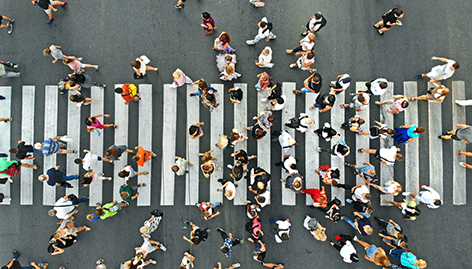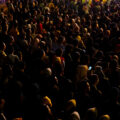Authority in the face of the digitalisation of religion
Authority in the face of the digitalisation of religion
Religious authority has become increasingly fragmented in Europe. Digitalisation has encouraged this particularly, and across all major religious communities in Europe. There are two ways in which the digitalisation of religion has broken religious authority apart in Europe: it has allowed national authority to prevail upon religious authority more easily, and it has allowed individual decisions to replace authoritative ones. While both national authority and individual life have been rising in Europe for some time, the current COVID-19 pandemic has given these even greater precedence, with digitalisation now playing a defining role.
This article was written in preparation for our round table on digital religion. Please find the full white paper here.
European Muslims: religious authority fragmented
Muslims in Europe have in particular seen the fragmentation of their religious authority structures. The rise of Islamism in Europe has been made possible by the weakening presence and relevance of traditional forms of religious authority. Digital technology has played a key role in this. For example, ISIS has been able to readily radicalise European Muslims through digital content, communication, and communities. This has undermined authoritative Muslim narratives with ‘narratives of conflict’ in Europe.[1] “Salafi-Islamism has become such a major influence within British Islam,” says the UK’s anti-extremism commissioner Sara Khan, “crowding out voices that advocate a more reconciled British Muslim identity.”[2] The terrorist offences caused by digitally fostered Islamism have placed religion in direct conflict with national authority. The response has been the expansion of national authority over Muslim religious life in Europe. The UK parliament passed a bill to stop the early release of Islamist extremists convicted of terror offences. The bill specifically aimed to prevent terror attacks by convicted terrorists released early from prison, such as the London Bridge knife attacks by Usman Khan in November 2019 and the Streatham stabbings by Sudesh Amman in February 2020. The government also pledged tougher sentences for serious terrorist offenders, including a 14-year minimum for worst offenders, and more funding to the police to deal with terror offences.[3] In response to terror attacks by Islamist militants in recent years, France similarly banned foreign imams from teaching in France. Part of French President Emmanuel Macron’s crackdown on “Islamist separatism”, this ban promises greater government control over the schooling of Muslim children, the financing of mosques, and the training of imams. The new measures aim to stop “foreign interference” in how Islam is practised in France, and replace measures that have allowed Muslim-majority countries to send teachers and imams to France.[4]
COVID-19: national authority takes precedence
This expansion of national authority has been enhanced by the COVID-19 crisis in Europe, where lockdown restrictions have greatly disrupted religious practice for all major faiths. For example, France saw mosque and church closures across the country as part of its lockdown. This shifted congregational life online. Crucially, these restrictions were made possible through the close cooperation between religious and state authorities. The Grand Mosque in Paris was closed not only as a health safety measure but also to demonstrate solidarity with the French citizenry and state.[5] Similarly, Catholic media KTO based in Paris reinforced its ‘national’ character during its live broadcast of all the major ceremonies. Archbishop Chrysostomos II in Cyprus also played a crucial role, promoting the enforcement of restrictions proposed by President Nicos Anastasiades.[6]
The compliance with national authority was not uniform across Europe, however: for example, churches in Bulgaria defied the lockdown by remaining open and allowing clergymen to bypass social distancing during religious rituals.[7] Similar examples were seen in Moldova[8] and Hungary[9]. These, however, stand in stark comparison to the outright resistance of religious leaders in countries outside Europe: in Pakistan, for example, religious leaders were successfully able to resist inclusion into the national lockdown, reflecting the Pakistani state’s long-standing dependency on religious institutions to justify its authority. In the case of Pakistan, religious leaders also successfully questioned the legitimacy of the digitalisation of religious practices.[10]
COVID-19: narrowing the space for religious authority?
The inability of religious institutions to conduct their collective practices during the COVID-19 pandemic radically limited their ability to exercise their authority. For example, in a historically unprecedented act, Pope Francis in Italy allowed individual confessions without the mediation of a priest.[11] Complying with state restrictions, priests in Italy were also unable to personally visit the sick.[12] Ironically, digitalisation enabled this narrowed religious authority to nevertheless maintain its relevance. For example, Pope Francis shifted to live-streamed mass, which was seen and followed by both believers and non-believers alike.[13] Similarly, it allowed previously disparate Muslim scholars and imams across Europe to come together. Responding to rising questions on how to practice Ramadan during the pandemic, the Islamic Council of Europe held an emergency online symposium to discuss possible answers. Attended by over 35 scholars and imams from diverse backgrounds, the symposium agreed on unprecedented Ramadan guidelines for the pandemic. These guidelines offer solutions to issues such as mass prayer, fasting for frontline healthcare workers, and religious burials of COVID-19 fatalities. In addition to these guidelines, the symposium announced C.A.L.M. (COVID-19 Advice Line for Muslims), a new national helpline for Muslims seeking guidance.[14]
Losing religious authority: an uncertain future
Europe has indeed seen the fragmentation of authority of all major religions in Europe in favour of stronger national authority as well as more individual forms of religious life. This has been accelerated by both digitalisation in Europe and the COVID-19 lockdown. How this will impact European life remains uncertain. A rising concern has been how the breaking apart of religious authority in Europe will impact its religious minorities. A key example is of Muslims in France. With 8 per cent of the country being Muslim, France has the largest Muslim population in Europe. In 2011, France became the first country in Europe to ban the Muslim veil. The recent ban on foreign imams to teach in France arguably further normalises anti-Muslim sentiment in the country. French President Emmanuel Macron’s crackdown appears to be appeasing far-right voters, and is feared to further heighten attacks on ordinary Muslims. How the country is dealing with its Muslim minority shows that it is struggling to be a secular state whilst allowing for religious freedom. Freedom to practice faith is in fact, some argue[15], being attacked under the guise of secularism.
Would you like to stay updated on religion and society? Visit the EARS Dashboard.
[1] Islam, reform and the battle of narratives
[2] Ibid.
[3] Urgent crackdown on terror sentences will affect about 50 inmates
[4] Emmanuel Macron in stand-off with Turkey as France accused of ‘sowing chaos’
[5] French Muslim leader: Coronavirus is a chance for solidarity, not ‘punishment
[6] Archbishop backs lockdown extension | in-cyprus.com
[7] https://www.reuters.com/article/us-health-coronavirus-easter-orthodox-bu/bulgarian-christians-celebrate-easter-amid-coronavirus-outbreak-idUSKBN22100C
[8] Moldova Struggles to Secure Church Respect for Coronavirus Restrictions
[9] Churches Introduce Preventive Measures for Coronavirus Outbreak in Hungary
[10] Islamists are frustrating Pakistan’s fight against coronavirus
[11] Coronavirus, Papa: indulgenza plenaria a malati e medici
[12] Coronavirus, chiude piazza San Pietro. L’appello del Papa: “Responsabilità e collaborazione”
[13] Coronavirus, il Papa non si affaccerà per l’Angelus. E anche l’udienza sarà solo in video
[14] Symposium: Scholars and Imams discuss Ramadan during coronavirus pandemic
[15] France’s Struggle with Secularism and Islam Continues – Byline Times






